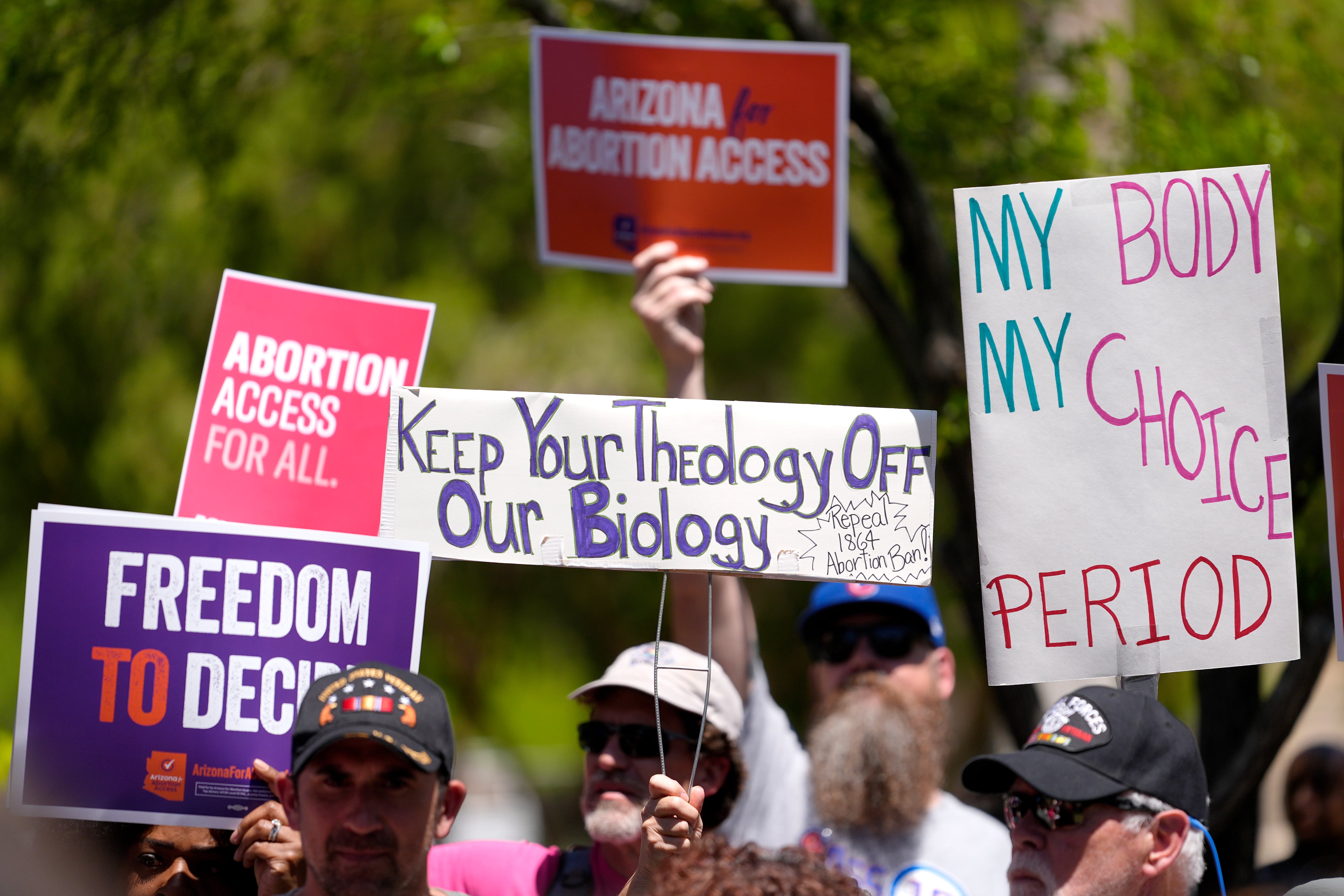Action in courts and state capitals around the U.S. this week have made it clear again: The overturning of Roe v. Wade and the nationwide right to abortion did not settle the issue.
One iteration of the issue was back before the U.S. Supreme Court on Wednesday for the second time in a month.
Meanwhile, Arizona lawmakers took a step toward repealing a near-total ban before enforcement can begin; California’s governor pitched providing an outlet to abortion providers and patients from neighboring Arizona if that ban takes take effect; and Tennessee moved closer to criminalizing helping a minor go out of state for an abortion without parental consent.
Here’s what to know about the latest developments.
ARIZONA LAWMAKERS ADVANCE REPEAL OF ABORTION BAN
Three Republican lawmakers joined Democrats in the Arizona House to advance a bill repealing an abortion ban that was first put on the books in 1864, decades before Arizona became a state.
Democrats, including Gov. Katie Hobbs, had been pushing for a repeal since the Arizona Supreme Court ruling earlier this month that found the ban can be enforced since Roe v. Wade’s overturning. Republicans had used procedural moves to block a vote on a repeal, which appears to have enough support to pass the state Senate.
The state’s attorney general, also a Democrat, said enforcement won’t begin until at least June 8.
There’s been pressure on Arizona lawmakers to repeal from the state’s governor, President Joe Biden, and the governor of neighboring state California. Gov. Gavin Newsom on Wednesday announced a measure that would allow doctors from Arizona to provide abortions for Arizona patients in California.
Under the proposed California legislation, Arizona providers could work in California without additional licenses through November.
Fourteen other states are already enforcing bans on abortion in all stages of pregnancy. But California has not proposed this kind of help for any of them, possibly because none shares a border with it.
At least one ballot measure on abortion could be before Arizona voters in November in the political battleground state.
ABORTION GOES BEFORE THE SUPREME COURT, AGAIN
The conservative majority of the U.S. Supreme Court, which overturned Roe v. Wade less than two years ago, seemed skeptical about the Biden administration’s contention in arguments Wednesday that Idaho should be forced to allow abortion during medical emergencies.
The administration argued that a federal law that requires care hospitals that accept Medicaid provide emergency care even when patients cannot pay means that hospitals must also provide abortions in emergency situations when a patient’s health is at serious risk.
Idaho’s exceptions are narrower than that, allowing abortion only when the woman’s life is at risk.
It was the second time in a month that abortion was before the high court. It’s also considering whether to roll back the U.S. Food and Drug Administration’s approvals for a drug that’s often used in combination with a second drug for medication abortions — which are now the most common method of abortion in the U.S.
Rulings on both cases are expected by June.
TENNESSEE POISED TO BAN TAKING MINORS ELSEWHERE FOR ABORTION
With a state Senate vote Wednesday, Tennessee became the second state to give full legislative passage to a measure banning taking a minor out of the state without parental consent to obtain an abortion.
If Gov. Bill Lee, a Republican, signs it into law, it would impact only the part of the journey in Tennessee — not the actual crossing of a state line.
Abortion is banned in all stages of pregnancy in Tennessee and five of the eight states it borders.
Idaho passed a similar law last year, but a court has put enforcement on hold because of a legal challenge. A Tennessee law would also likely also face court challenges.
California’s governor has also fought against this measure and others like it that were proposed in other states, launching an ad campaign against them earlier this year.
MAINE BECOMES LATEST STATE TO PROTECT PROVIDERS
Maine Gov. Janet Mills on Monday signed a bill making her state at least the 14th with a law intended to protect those who provide abortion for out-of-state patients from legal action in those other states.
Maine’s law will take effect in the summer.
It’s a reminder that abortion policy has flowed in two directions since the end of Roe v. Wade in 2022: Most GOP-dominated states have sought to tighten access, while most Democrat-controlled ones have moved to protect or expand it.
Like several of the others, Maine’s measure also applies to gender-affirming health care. In addition to imposing abortion bans or restrictions, most Republican-controlled states have also adopted bans on gender-affirming care for transgender minors.













